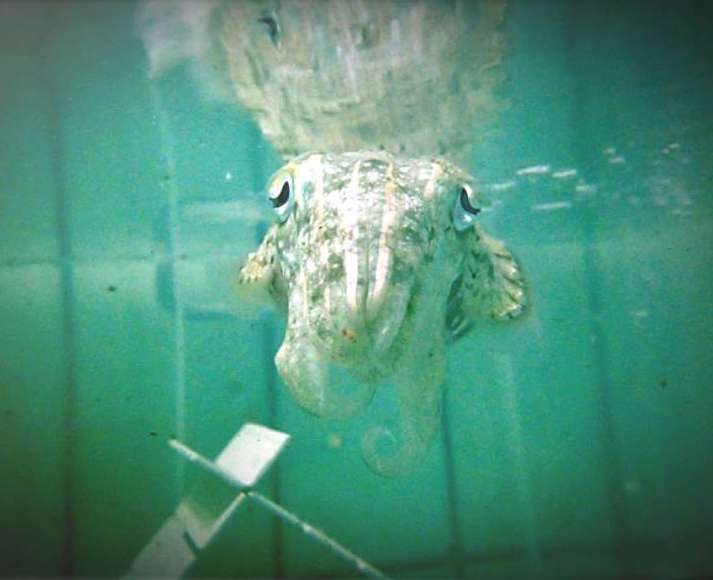August 24, 2016 report
Cuttlefish found to have number sense and state-dependent valuation

(Phys.org)—A pair of researchers with National Tsing Hua University in Taiwan has found that cuttlefish have both number sense and state-dependent valuation. In their paper published in Proceedings of the Royal Society B, Tsang-I Yang and Chuan-Chin Chiao describe a series of experiments they carried out with cuttlefish and what they learned about the cephalopods.
Human beings very clearly have number sense—from a very early age, they are able to make judgments about objects in the world around them based on how many of them there are. But few other animals have this ability. In this new effort, the research pair wondered if cuttlefish might because prior studies have shown them to have one of the more complex invertebrate brains. To find out, they set up a series of experiments all based around a type of food: shrimp.
The experiments consisted of offering young cuttlefish choices for a meal—a dead shrimp or a live one, a large shrimp or a small one, or two different quantities of shrimp—and then noting how the cuttlefish responded.
The researchers found that the cuttlefish, quite naturally, preferred the live shrimp over the dead ones, but their decision making was more nuanced than that. They preferred a large shrimp over two smaller ones when they were hungry, for example, but chose the small ones when they were not. Perhaps most interesting were the results found when the cuttlefish were given quantity options, e.g., one versus two shrimp, two versus three, three versus four and four versus five—they almost always chose the larger quantity option.
The researchers suggest these findings indicate that cuttlefish have number sense (they could see and comprehend that there were more or fewer shrimp in different groups) and that their choice of prey could depend on how hungry they were or the quality of the available prey—a form of state-dependent valuation. Such behavior also suggests that cuttlefish are capable of using both external (environmental conditions) and internal (their own preferences) information when making prey choices. Indeed, the researchers report that it appeared the cuttlefish at times took a moment to think over their choices before deciding which they preferred.
More information: Tsang-I Yang et al. Number sense and state-dependent valuation in cuttlefish, Proceedings of the Royal Society B: Biological Sciences (2016). DOI: 10.1098/rspb.2016.1379
Abstract
Identifying the amount of prey available is an important part of an animal's foraging behaviour. The risk-sensitive foraging theory predicts that an organism's foraging decisions with regard to food rewards depending upon its satiation level. However, the precise interaction between optimal risk-tolerance and satiation level remains unclear. In this study, we examined, firstly, whether cuttlefish, with one of the most highly evolved nervous system among the invertebrates, have number sense, and secondly, whether their valuation of food reward is satiation state dependent. When food such as live shrimps is present, without training, cuttlefish turn toward the prey and initiate seizure behaviour. Using this visual attack behaviour as a measure, cuttlefish showed a preference for a larger quantity when faced with two-alternative forced choice tasks (1 versus 2, 2 versus 3, 3 versus 4 and 4 versus 5). However, cuttlefish preferred the small quantity when the choice was between one live and two dead shrimps. More importantly, when the choice was between one large live shrimp and two small live shrimps (a prey size and quantity trade-off), the cuttlefish chose the large single shrimp when they felt hunger, but chose the two smaller prey when they were satiated. These results demonstrate that cuttlefish are capable of number discrimination and that their choice of prey number depends on the quality of the prey and on their appetite state. The findings also suggest that cuttlefish integrate both internal and external information when making a foraging decision and that the cost of obtaining food is inversely correlated with their satiation level, a phenomenon similar to the observation that metabolic state alters economic decision making under risk among humans.
Journal information: Proceedings of the Royal Society B
© 2016 Phys.org





















